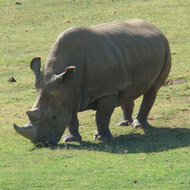
Experts agree IVF may be the best chance for animal's survival
Veterinary experts are pinning their hopes on IVF treatment to save the northern white rhino from extinction, the Guardian reports.
During an emergency meeting on Tuesday (27 January) on the Ol Pejeta Conservancy in Kenya, conversationists came to the conclusion that the best chance for the animals' survival is to harvest eggs from the remaining females, with a view to them being used for IVF in the future.
The embryo could then be implanted in the womb of a surrogate southern white rhino, a closely related rhinoceros subspecies that is less endangered.
No white rhino calves have been born since 2000. The species has not been seen in the wild for seven years and all remaining white rhinos are under human care. Three now reside at the Ol Pejeta Conservancy in central Kenya, one at Dvur Kralove in the Czech Republic, and one at San Diego Zoo in the USA.
The experts say that frozen eggs and sperm could be used to revive the animal artificially, but neither method will provide an immediate solution. This means that the northern white rhino will likely disappear, at least for a short time.
Image (C) Sheep81



 The BSAVA has opened submissions for the BSAVA Clinical Research Abstracts 2026.
The BSAVA has opened submissions for the BSAVA Clinical Research Abstracts 2026.